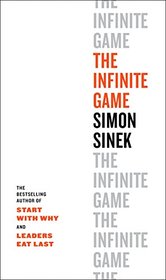Search -
The Infinite Game
The Infinite Game
Author:
A bold framework for leadership in today's ever-changing world. How do we win a game that has no end? Finite games, like football or chess, have known players, fixed rules and a clear endpoint. The winners and losers are easily identified. Games like basketball and chess are finite, with firm rules and clear endpoints... more »
Author:
A bold framework for leadership in today's ever-changing world. How do we win a game that has no end? Finite games, like football or chess, have known players, fixed rules and a clear endpoint. The winners and losers are easily identified. Games like basketball and chess are finite, with firm rules and clear endpoints... more »
ISBN-13: 9780735213500
ISBN-10: 073521350X
Publication Date: 10/15/2019
Pages: 251
Rating: 2
ISBN-10: 073521350X
Publication Date: 10/15/2019
Pages: 251
Rating: 2
4.5 stars, based on 2 ratings
Publisher: Portfolio
Book Type: Hardcover
Other Versions: Paperback, Audio CD
Members Wishing: 21
Reviews: Amazon | Write a Review
Book Type: Hardcover
Other Versions: Paperback, Audio CD
Members Wishing: 21
Reviews: Amazon | Write a Review
Genres:
- Business & Money >> Business Culture >> Motivation & Self-Improvement
- Business & Money >> Management & Leadership >> Decision-Making & Problem Solving
- Business & Money >> Management & Leadership >> Leadership & Motivation
- Business & Money >> Management & Leadership >> Motivational
- Business & Money >> Skills >> Decision Making




